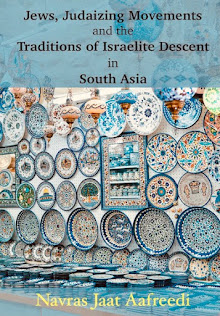Anonymous,
Weekly Press Pakistan, October 9, 2013
Editor
International of the English Section of the Weekly Press Pakistan and Indo-Judaic
Studies scholar, Dr. Navras Jaat Aafreedi would be Visiting Fellow at the
Institute of Asian Studies in Brisbane in Queensland, Australia, from 27th
October to 5th November, 2013, during which he will present Weekly
Press Pakistan as a case study to explain how press can be used as a tool
for achieving interfaith peace and reconciliation, at an international
symposium on religion journalism, scheduled to take place on the 30th
and 31st October, 2013, at the Multi-Faith Centre of Griffith
University there. The symposium will examine how journalists can better report
on faith and how faith leaders and opinion makers can encourage the inclusion
of religious perspective in the news. The symposium is being jointly organized by
the Griffith University Multi-Faith Centre and the International Association of
Religion Journalists (IARJ). Founded in 2002, the Multi-Faith Centre is a place
where people from diverse faith, religious and spirituality traditions can
deepen their understanding of their own faith and actively participate in
inter-faith dialogue, education and action. The International Association of
Religion Journalists (IARJ) is a global network of journalists promoting excellence
in the coverage of religion and spirituality. It provides services and resources
to strengthen and support the work of its members. It engages media leaders,
educational institutions and communities on the importance of accurate,
balanced and ethical religion coverage to foster understanding.
Dr.
Aafreedi’s Australia trip will be supported by a fellowship from the American
academic organization Scholars for Peace in the Middle East (SPME). It is a not
for profit, grass-roots community of scholars who have united to promote
honest, fact-based, and civil discourse, especially in regard to Middle East
issues. Dr. Aafreedi, who currently works as an Assistant Professor at the School
of Humanities & Social Sciences, Gautam Buddha University in Greater NOIDA,
India, has been involved with interfaith peace activism for a number of years
and has researched Muslim-Jewish relations as the first Visiting Fellow at the
Centre for the Study of Muslim-Jewish Relations (CMJR) at the Woolf Institute
in Cambridge, United Kingdom. He has to his credit a series of multi-cultural
and cross-cultural dialogues he organized at the University of Lucknow and
other institutions there involving students from India and more than a dozen
countries of different continents. His sincere efforts for Muslim-Jewish
reconciliation have been greatly appreciated. Among the fifty-six events he
organized in his hometown Lucknow between 2008 and 2010, he has to his credit
the first ever Holocaust films retrospective in South Asia, during which
forty-six films were screened, seen by four thousand people. He has also been
at the forefront in fighting anti-Semitism in the Indian Muslim press. He is
also the first person to make any worthwhile contributions to Jewish Studies in
Urdu, the lingua franca of almost all South Asian Muslims, the largest Muslim
population in the world. He is also a member of the International Advisory Boards
of the Jerusalem Press Club and of the Asian Jewish Life and of the
editorial board of the refereed Journal of Indo-Judaic Studies. He plans
to offer free certificate courses in Holocaust Studies and Jewish Studies under
the auspices of his newly established NGO, Society for Social Regeneration
& Equity (SSRE) in the coming days and to also get recognition to those
courses from prestigious universities. In addition to this, he intends to hold
exhibitions and screen films across India to raise an awareness of the
Holocaust, combat its denial and minimization and check the rising popularity
of Hitler in India.
Besides
presenting his paper, “Press as a tool for achieving interfaith peace: The Case
of Weekly Press Pakistan”, Dr. Aafreedi will also take part in a panel
on “Majority Issues versus Minority Issues”. His fellow panelists will be
Florence Spurling of Encounter, ABC Radio National and Rachael Kohn, Producer
and host of ABC Radio National’s The Spirit of Things, and it will be chaired
by Scott Stephens, Religion and Ethics Editor for ABC Online.
The
symposium will engage with critical issues such as the role of bias in religion
journalism, the secularization of religious conflicts and the personal and
professional challenges to reporting on faith. In addition to a series of paper
presentations and discussion panels, the symposium will feature workshops on
developing news stories and using social media to report on faith issues.








.jpg)

















